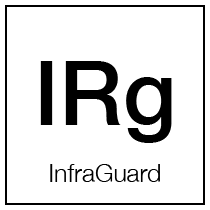Do Collagen Supplements Help My Skin?
Since decreased collagen production leads to signs of aging, many companies have marketed expensive drinkable and other forms of oral collagen as an anti-aging solution. Medical specialists explain how these claims are completely inaccurate.
Do a quick search for "drinkable collagen" on Google and hundreds of results materialize, many of which feature enticing reviews from people claiming collagen supplements did amazing things for their skin. In theory, the thought of tossing back a collagen-infused beverage for a healthier complexion sounds worthy of writing home about, but it begs the all-too-blatant question: Does it actually work?
What scientific experts say about the subject


Collagen has become a buzzword that’s been creeping into our beauty products, supplements, and Facebook ads. Collagen is an incredibly important protein that keeps your tissues and bones together. It is made up of strings of amino acids, which bind together in a specific pattern to form the structure for things like ligaments, tendons, and skin. Ithelps to give your skin structure and elasticity, or that famous “bounce”.Collagen is naturally manufactured within the human body using vitamin C, but its production does begin to decrease by about one percent, starting after the age of 20. This is what causes the skin to lose its youthful strength and thickness.


Since decreased collagen production leads to signs of aging, many companies have marketed drinkable and other forms of oral collagen as an anti-aging solution.
Dr. Leslie Baumann, is an American dermatologist, author, and researcher based in Miami, Florida. She founded the Cosmetic Dermatology Center at the University of Miami and has authored several dermatology textbooks and articles in Dermatology News. Dr. Baumann advocates that these claims, made by companies marketing drinkable collagen, are completely inaccurate. She explains that collagen is broken down by your stomach acids when taken orally before it can benefit your skin.
Dr. Janelle Vega, a board-certified dermatologist in Florida USA agrees. She says that the pH of the stomach is so extreme, only fragments of collagen will survive. There is no evidence that these fragments will pass through your digestive system, get absorbed by the blood and be directed into the skin.
Dr. Karyn Grossman is an internationally renowned, board-certified cosmetic dermatologist with a well-known celebrity following. Trained at Harvard Medical School, she’s considered a key opinion leader in all fields of esthetics. Dr. Grossman notes that ingestible collagen is made from hydrolyzed protein from animal sources (generally cows, pigs, and fish). “When you eat meat, fish, and poultry, you’re also ingesting collagen,” she says. “These proteins are broken down and absorbed in the GI tract, then used to build your own protein-rich parts: skin, bones, muscle, connective tissue."
Dr. Grossman explains that it's important to note that it's impossible to specifically target certain areas of the body when you ingest a collagen supplement. "When you consume a source of collagen, it will be broken down, after which it may be absorbed by your bloodstream, and then be transported to different parts of the body as needed. All proteins are broken down completely and they're not just comfortably put in as collagen where collagen is needed. It doesn't work like that. The raw science is that it won't be collagen when it's absorbed. Your body won't have a clue that you ate collagen because it will be individual amino acids when it's absorbed in your body, this makes it difficult to tell if ingesting collagen will have any sort of sizable impact on your body, let alone your skin".


Dr. Jessica Weiser, a dermatologist at New York Dermatology Group says while the supplements are generally safe in appropriate doses (consult a doctor or pharmacist), too much can spike your calcium levels, leading to kidney stones or even kidney failure.
Collagen supplements and powders are not highly regulated and they can contain a variety of ingredients.
In most cases, ingredients in these supplements may include animal bones and skin as well as fish scales, which can potentially be high in heavy metals. Potential side effects of consuming these heavy metals can include diarrhea, nausea, heartburn, and skin reactions, said Dr. Weiser.
Also, per the US Food and Drug Administration (FDA), federal law doesn't "require dietary supplements to be proven safe to FDA's satisfaction before they are marketed." That isn't to say all supplements are dangerous, but it is worth noting that what you're taking may not necessarily be safe to ingest.
Business Insider previously reported in 2017 that some supplement manufacturers have been found to use contaminated products and print incorrect nutritional information on labels, which can be extremely dangerous. It's up to the consumer to do their research and only purchase supplements from companies they really trust. Notably, since the FDA categorizes supplements as a food, not a drug, they do not verify the claims made about these items.
When choosing a supplement, Dr. Weiser advises looking for a third-party tested supplement (it will say so on the box) stamped by a quality-control organization such as US Pharmacopeia or the National Science Foundation. “Be wary of supplements that make fantastic claims — ‘cure this,’ ‘look 30 years younger,’” she says. “One thing cannot possibly do the job of everything.”


While there have been studies where collagen supplements have improved skin, it’s mostly in mice and rats and even pigs. It's also very important to realize that what works in the lab doesn’t always work for our skin. Another problem with these supplement studies is that they often use a combination of ingredients. This means you can’t say for sure that it’s the collagen having an effect. It’s even trickier since there are 28 different types of collagen, and not all of them help your skin.
Collagen proteins are also made up of thousands of amino acids. Most supplements use collagen that’s been hydrolyzed (broken up), but you can break it up in many ways. It’s likely that the body doesn’t necessarily treat them all the same way. This means that a study showing a benefit with one form of collagen doesn’t tell you anything about the other forms of collagen — or even other collagen supplements.
About those “according to scientific reports”: Have there been clinical human studies on collagen? Sure. However, that brings up another problem. A lot of these studies are performed by people selling collagen supplements. There’s an obvious bias toward publishing good results.


You can get plenty of collagen by eating meat. If you are a vegan or vegetarian, your body can still make its own collagen. Eat foods that are rich in vitamin C or take a vitamin C supplement, since this vitamin is required in order to make collagen.
Anti-aging tips that all medical and scientific experts agree on
Collagen supplements aren’t worth wasting your money on, but there are some easy anti-aging tricks that can help to stave off wrinkles and other signs of skin aging.
- Add vitamin C to your skincare routine. Vitamin C is one of the most beneficial topical ingredients for your skin. As mentioned above, vitamin C is needed in order for your skin to make collagen. Drink an affordable vitamin C supplement and add a high-quality vitamin C containing serum to your daily skincare routine. This will help to boost your skin’s ability to produce this important protein. DermExcel Collagen serum.
- Add retinoids to your skincare routine. Retinoids are another beneficial ingredient. They also help your skin to produce collagen and are used as a treatment for acne and wrinkles for this reason. DermExcel Retinol serum.
- Don’t smoke. Smoking accelerates the breakdown of collagen in your skin, so avoiding this habit can help to keep your skin looking younger and healthier.
- Don’t tan. UV light from the sun and indoor tanning beds can also cause collagen to break down more rapidly. Include sunscreen in your daily skincare routine, and avoid deliberate tanning. DermDefence SPF50.
- Try in-office treatments. Many in-office treatments, like micro-needling and laser skin treatments, can help stimulate collagen production. Talk to a Dermal Health dispensing practice about your anti-aging treatment options.
Expensive collagen drinks and supplements are not necessary. There are other ways to make sure your skin is able to produce enough collagen on its own, like taking a vitamin C supplement, applying retinol, hyaluronic acid, and vitamin c serums, staying out of the sun and professional skin treatments.
Potent Anti-aging products
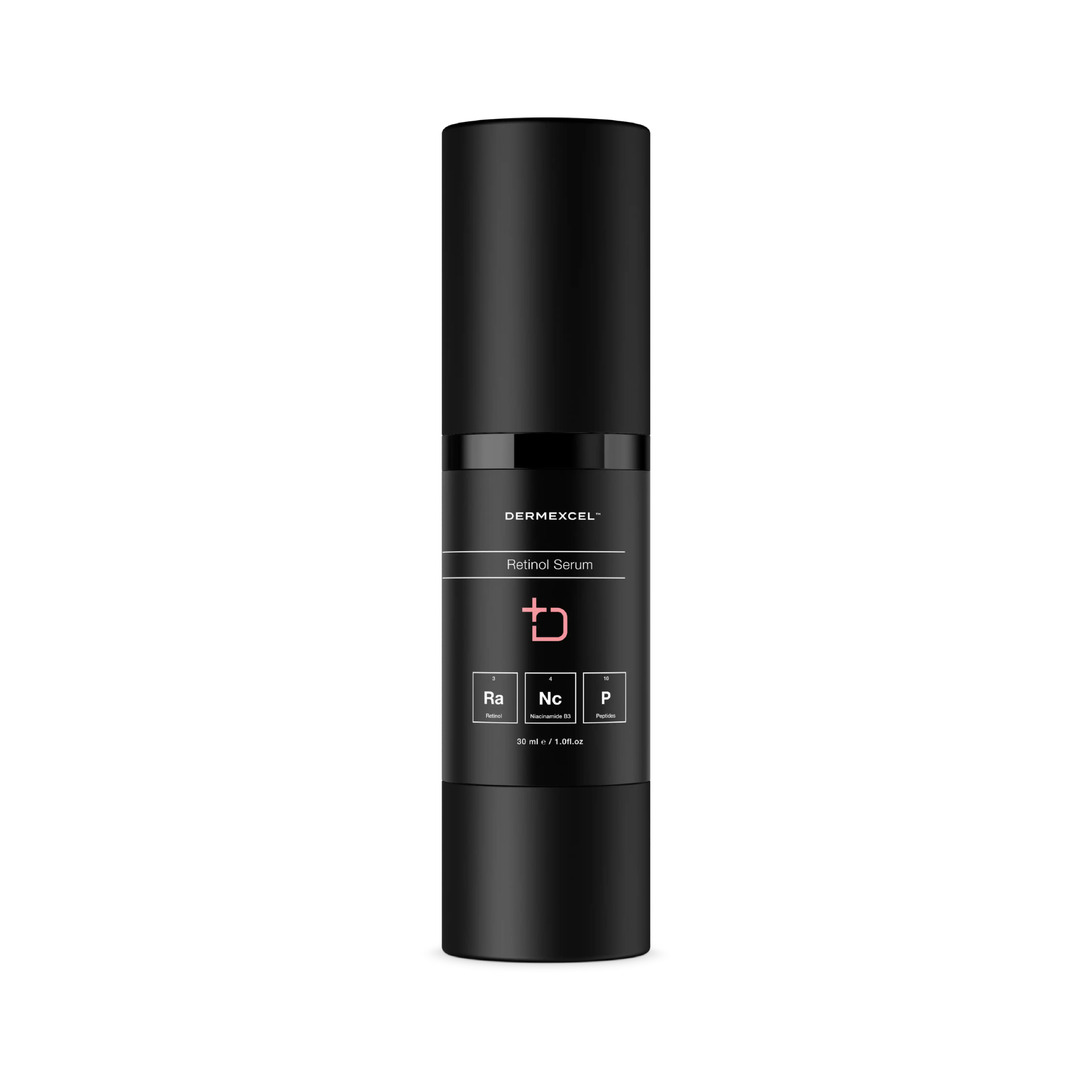
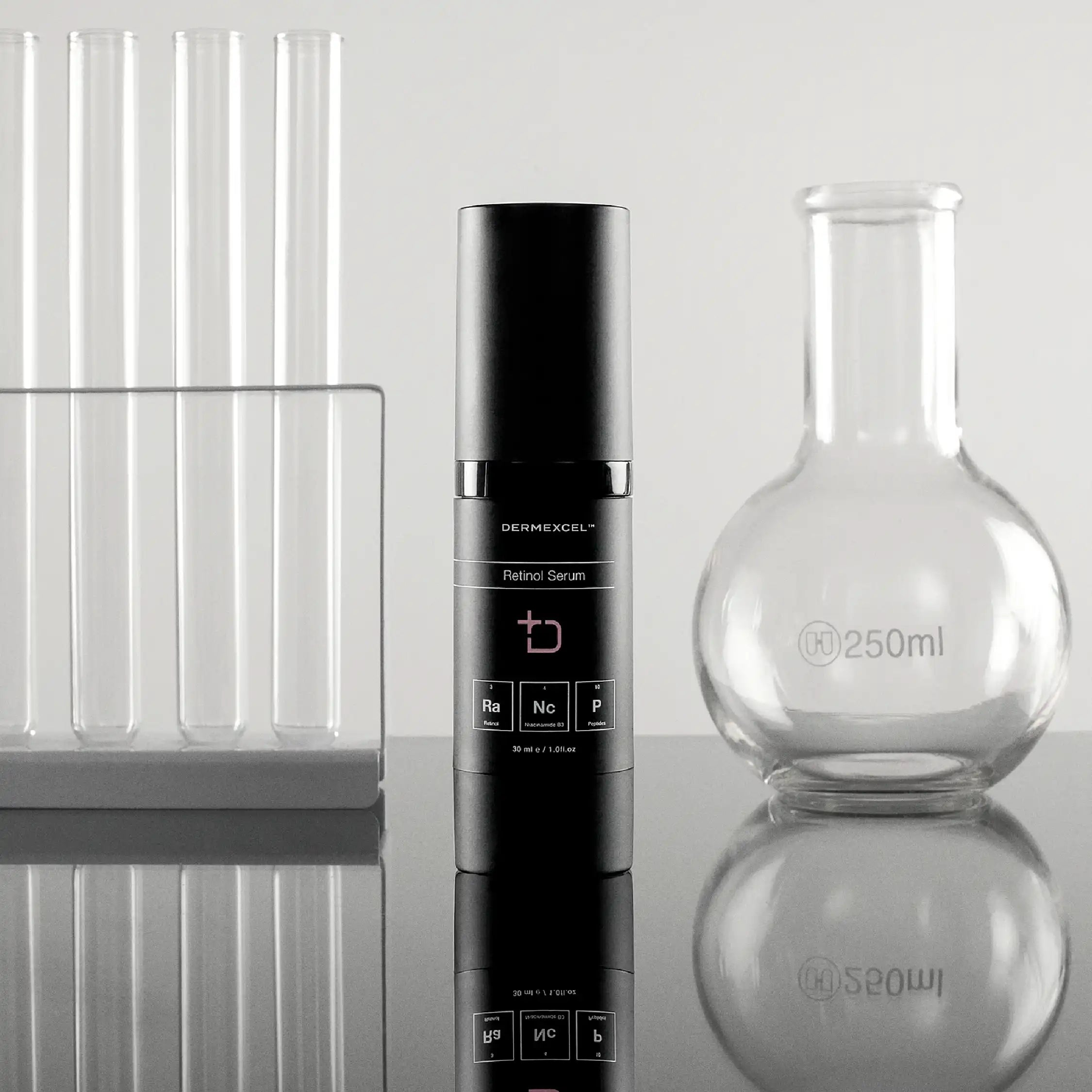




Pay interest-free installments from $29.16 with various payment gateways selected at checkout.
SIZE: 30 mL

Unclog Pores

Minimize Pores

Smooth Skin

anti-aging

DNA repair
A scientifically formulated skincare solution with state-of-the-art active ingredients. Retinol Serum stimulates epidermal growth and counters signs of aging, reducing hyperpigmentation and promoting collagen and elastin growth, vital for skin elasticity and structure.
Retinol Serum supports skin cell health, protecting skin cells from environmental stressors and aiding acne treatment. Its advanced formulation stimulates collagen production, reduces inflammation, inhibits pigmentation, and accelerates cell turnover. It also aids in combating acne by reducing sebum production and unclogging pores.
Retinoic acid analogue
Retinoic acid, often referred to as tretinoin in its pharmaceutical form, is the active form of Vitamin A. It is widely recognized for its powerful effects in dermatology and skin care, particularly in treating acne and signs of skin aging.
Retinoic acid works at the cellular level to modify gene expression and affect cell growth. In treating acne, it promotes the turnover of skin cells, reducing the likelihood of pore-clogging and helping to clear existing breakouts. Additionally, it decreases the cohesiveness of follicular epithelial cells, further preventing the formation of comedones.
Retinoic acid's ability to stimulate collagen production is a key benefit in anti-aging skincare. This leads to a reduction in fine lines and wrinkles and an improvement in overall skin texture and tone. It also aids skin discoloration and hyperpigmentation by accelerating cell turnover, bringing new skin cells to the surface faster, and shedding pigmented and damaged cells.
Despite its benefits, retinoic acid can irritate the skin, causing side effects like redness, dryness, and peeling, especially during the initial period of use. Its potency means it is generally available by prescription and requires careful monitoring by a healthcare professional.
Hydroxypinacolone Retinoate (HPR) is a newer, esterified form of retinoic acid. Unlike cosmetic retinol, HPR binds directly to the retinoid receptors of the skin cells without needing conversion. This direct binding allows it to deliver similar benefits to retinoic acid, such as stimulating collagen production, improving skin elasticity, and reducing signs of aging, but with a lower risk of irritation.
HPR is considered more gentle and less irritating than traditional retinoic acid while offering comparable benefits. With HPR, everyone has access to the benefits of prescription retinoids without the risk of side effects.
Physiological Effects
- Cell Turnover and Renewal: HPR promotes rapid cell turnover, aiding in the exfoliation of dead skin cells and generating new cells.
- Skin Texture: Promoting cell renewal improves skin texture and addresses issues like roughness and dullness.
- Collagen Production: It stimulates collagen production, which is essential for reducing the appearance of fine lines and wrinkles and improving skin elasticity.
- Acne Treatment: Effective in treating acne by unclogging pores and reducing the size of sebaceous glands, it diminishes both inflammatory and non-inflammatory acne lesions.
- Pigmentation: It can reduce hyperpigmentation by accelerating the turnover of hyperpigmented skin cells and inhibiting melanin production.
- Photoaging: Effective in treating signs of photoaging, reversing some of the damage caused by UV radiation.
Special Benefits
- Retinoid Receptor Activity: HPR, an ester of retinoic acid, binds directly to retinoid receptors in the skin, enabling it to work without needing to be converted into retinoic acid.
- Lower Irritation: Typically, it causes less irritation than retinoic acid, making it more suitable for sensitive skin types.
- Collagen Stimulation and Anti-Aging: Like retinoic acid, HPR helps in stimulating collagen production and has anti-aging properties.
- Acne and Hyperpigmentation: It effectively treats acne and reduces hyperpigmentation, often with fewer side effects than retinoic acid.
- Stability and Penetration: HPR is more stable and lipid-soluble, so it penetrates the skin more effectively and is less prone to degradation.
References
- Zaenglein, A. L., Pathy, A. L., Schlosser, B. J., Alikhan, A., Baldwin, H. E., Berson, D. S., ... & Thiboutot, D. M. (2016). Guidelines of care for the management of acne vulgaris. Journal of the American Academy of Dermatology, 74(5), 945-973.e33.
- Fisher, G. J., Wang, Z. Q., Datta, S. C., Varani, J., Kang, S., & Voorhees, J. J. (1996). Pathophysiology of premature skin aging induced by ultraviolet light. New England Journal of Medicine, 337(20), 1419-1428.
- Truchuelo, M. T., Jiménez, N., Jaén, P. (2018). Assessment of the efficacy of a new complex-based retinoic acid and retinol in a 3-month study using objective methods and skin biomarker analysis. Journal of Cosmetic Dermatology, 17(3), 347-354.
- Mukherjee, S., et al. (2006). Retinoids in the treatment of skin aging: an overview of clinical efficacy and safety. Clinical Interventions in Aging.
- Randhawa, M., et al. (2015). Hydroxypinacolone retinoate: a new retinoid and its use in dermatology. Skin Therapy Letter.
Niacinamide
Niacinamide offers several benefits for the skin, primarily due to its anti-inflammatory and antioxidant properties. It reduces the redness and inflammation associated with acne, rosacea, and other inflammatory skin conditions. Additionally, niacinamide's ability to improve the skin's barrier function benefits all skin types, particularly those with eczema or mature skin.
Another significant benefit of niacinamide is its role in reducing hyperpigmentation. Studies have shown that it can decrease the transfer of melanin to the epidermis, helping to fade dark spots and even out skin tone.
Niacinamide also plays a role in reducing the visible signs of aging. It has been found to stimulate collagen production and improve skin elasticity, reducing fine lines and wrinkles. Its antioxidant properties further protect the skin from environmental damage, such as pollution and UV radiation, which contribute to premature aging.
The efficacy of niacinamide and its ability to address multiple skin concerns simultaneously has led to its growing popularity in both over-the-counter and prescription skincare formulations.
Physiological Effects
- Barrier Function Enhancement: Niacinamide helps strengthen the skin’s barrier function by increasing the production of ceramides, lipids that keep the skin hydrated and protect against environmental damage.
- Anti-inflammatory Properties: It has notable anti-inflammatory effects, which are beneficial in reducing redness and inflammation associated with acne, eczema, and other inflammatory skin conditions.
- Sebum Regulation: Niacinamide helps regulate sebum production, which controls excess oiliness and can benefit acne-prone skin.
- Hyperpigmentation Reduction: It reduces hyperpigmentation by inhibiting melanosome transfer from melanocytes to keratinocytes, leading to an even skin tone.
- Anti-aging Effects: Niacinamide helps reduce the appearance of fine lines and wrinkles by boosting collagen production and improving skin elasticity.
- Antioxidant Activity: It has antioxidant properties, protecting the skin from oxidative stress and environmental aggressors like UV radiation and pollution.
Managing Dermatological Conditions
- Acne and Oily Skin: Niacinamide effectively manages acne and oily skin by regulating sebum and reducing inflammation.
- Hyperpigmentation and Melasma: Its ability to reduce melanin transfer benefits it in treating hyperpigmentation and melasma.
- Aging Skin: Niacinamide targets wrinkles and loss of firmness.
- Skin Barrier Disorders: Niacinamide is beneficial in treating skin barrier disorders like atopic dermatitis and eczema by enhancing barrier function and hydration.
- Photodamage and Skin Protection: It helps mitigate the effects of photodamage and provides some degree of protection against environmental damage.
References
- Gehring, W. (2004). Nicotinic acid/niacinamide and the skin. Journal of Cosmetic Dermatology.
- Bissett, D. L., Oblong, J. E., & Berge, C. A. (2005). Niacinamide: A B vitamin that improves aging facial skin appearance. Dermatologic Surgery.
- Snaidr, V. A., Damian, D. L., & Halliday, G. M. (2019). Nicotinamide for photoprotection and skin cancer chemoprevention: A review of efficacy and safety. Experimental Dermatology.
- Navarrete-Solís, J. et al. (2011). A Double-Blind, Randomized Clinical Trial of Niacinamide 4% versus Hydroquinone 4% in the Treatment of Melasma. Dermatology Research and Practice, 2011.
Peptides
Peptides are short chains of amino acids with a wide range of biological functions and skin benefits. They are essentially small fragments of proteins, which are fundamental components of all living cells, including collagen and elastin in the skin.
In skincare, peptides are known for enhancing skin repair and rejuvenation. They function as signaling molecules, instructing cells to perform specific tasks such as producing collagen and elastin, vital for maintaining the skin's firmness and elasticity. This makes peptides especially beneficial in anti-aging products, as they can help reduce the appearance of fine lines and wrinkles.
Research has shown that certain peptides can improve skin barrier function, increase hydration, and soothe skin inflammation. This makes them suitable for products targeting dry, sensitive, or inflamed skin.
Peptides, with their diverse functions in promoting collagen production, strengthening the skin barrier, wound healing, and anti-inflammatory actions, are pivotal in managing various dermatological conditions, particularly in anti-aging, sensitive skin care, and wound healing applications.
Physiological Effects
- Collagen Production: Certain peptides, known as signal peptides, stimulate collagen production in the skin, enhancing skin firmness and reducing the appearance of fine lines and wrinkles.
- Skin Barrier Strengthening: Peptides can strengthen the skin barrier, improve hydration, and protect against environmental damage.
- Wound Healing: Some peptides play a role in the skin's natural healing process, aiding tissue repair and regeneration.
- Anti-Inflammatory Effects: Certain peptides have anti-inflammatory properties, helping to soothe and calm irritated skin.
- Antimicrobial Action: Some peptides possess antimicrobial properties, potentially helping to manage acne and other skin infections.
Managing Dermatological Conditions
- Aging Skin: Peptides can stimulate collagen production and improve skin elasticity.
- Sensitive Skin Conditions: Peptides are beneficial for sensitive or inflamed skin due to their soothing properties.
- Acne-Prone Skin: Antimicrobial peptides can be effective in acne treatment formulations.
- Wound Care and Repair: Peptides improve wound healing and reduce scarring.
References
- Gorouhi, F., & Maibach, H. I. (2009). Role of topical peptides in preventing or treating aged skin. International Journal of Cosmetic Science.
- Schagen, S. K. (2012). Topical peptide treatments with effective anti-aging results. Cosmetics.
- Varani, J., et al. (2001). Vitamin A antagonizes decreased cell growth and elevated collagen-degrading matrix metalloproteinases and stimulates collagen accumulation in naturally aged human skin. Journal of Investigative Dermatology.
Matrixyl 3000
Matrixyl 3000: The Powerhouse of Anti-Aging Peptides
Matrixyl 3000, a trademarked peptide composition, has revolutionized the approach towards anti-aging in dermatological products. This innovative ingredient combines two peptides, Palmitoyl Tripeptide-1 and Palmitoyl Tetrapeptide-7. The synergy of these peptides enhances skin repair and reduces the appearance of aging.
Physiological Effects
- Collagen and Elastin Stimulation: Matrixyl 3000 promotes the production of collagen and elastin, key proteins that provide skin structure and elasticity. This helps reduce the appearance of fine lines and wrinkles.
- Skin Repair and Regeneration: It aids in the skin's repair process, enhancing the overall texture and tone, and may help reverse the signs of aging.
- Anti-inflammatory Properties: Matrixyl 3000 can have anti-inflammatory effects, reducing inflammation and potentially aiding in skin repair.
- Hydration Enhancement: Improving the underlying skin structure can enhance hydration, leading to a plumper, more youthful appearance.
Managing Dermatological Conditions
- Aging Skin: Its primary use is in anti-aging skincare products to combat wrinkles, fine lines, and other signs of aging.
- Improving Skin Texture and Tone: Matrixyl 3000 can improve overall skin texture, which is beneficial for skin that has lost smoothness or become rough due to aging.
- Skin Elasticity: It can help improve skin elasticity, making it appear firmer and more toned.
Biochemical Mechanism and Clinical Efficacy
Matrixyl 3000 mimics the appearance of broken-down collagen, causing the skin to react by producing more collagen and elastin. Palmitoyl Tripeptide-1 is known for stimulating collagen synthesis and firming the skin, while Palmitoyl Tetrapeptide-7 reduces inflammation, a key contributor to aging.
Studies have shown that Matrixyl 3000 significantly improves skin elasticity and reduces wrinkle depth. A notable study published in the "International Journal of Cosmetic Science" demonstrated that Matrixyl 3000 reduced wrinkle volume and depth by up to 45% after 2 months of use (Smith, 2005).
Matrixyl 3000 stands out as a non-irritating, highly effective ingredient. Its role in stimulating collagen and elastin production and reducing inflammation is a cornerstone in anti-aging skincare regimens.
References
- Smith, J. (2005). "Effects of Matrixyl 3000 on Skin Aging." International Journal of Cosmetic Science.
- Sederma Inc., "Matrixyl 3000 Technical Overview."
- Blackburn, R. S., et al. (2005). Matrixyl 3000 restores skin's metabolic balance. Journal of Cosmetic Science.
- Lintner, K., et al. (2007). Matrixyl 3000: A new approach to anti-aging. Personal Care Magazine.
- Gorouhi, F., & Maibach, H. I. (2009). Role of topical peptides in preventing or treating aged skin. International Journal of Cosmetic Science.
Acetyl Hexapeptide-8
Acetyl Hexapeptide-8: The Innovative Peptide in Anti-Aging Dermatology
Acetyl Hexapeptide-8 is a testament to the advancements in peptide technology in dermatology. Its ability to reduce facial muscle contractions non-invasively positions it as an essential ingredient in anti-aging skincare.
Biochemical Mechanism
Acetyl Hexapeptide-8 functions by inhibiting the neurotransmitters that trigger muscle contractions. This action reduces the intensity of wrinkle-causing facial expressions, leading to a visible decrease in fine lines and wrinkles. It mimics the N-terminal end of SNAP-25, competing with this natural protein for a position in the SNARE complex, thereby destabilizing it. As a result, neurotransmitter release is diminished, and facial muscle contractions are softened.
Physiological Effects
- Neurotransmitter Inhibition: Acetyl Hexapeptide-8 works by inhibiting neurotransmitter release. This leads to reduced facial muscle contraction, a mechanism similar to Botox but less invasive.
- Reduction of Expression Lines: Helps to reduce the appearance of expression lines, particularly around the forehead and eyes, by limiting muscle contraction.
- Improvement in Skin Texture: Regular use can lead to smoother skin texture and a reduction in the depth and severity of wrinkles.
Special Benefits
Clinical Efficacy - Clinical studies have demonstrated the effectiveness of Acetyl Hexapeptide-8 in reducing wrinkle depth. A study published in the "International Journal of Cosmetic Science" reported that a cream containing 10% Acetyl Hexapeptide-8 reduced wrinkles by 30% over 30 days (Blanes-Mira et al., 2002).
References
- Blanes-Mira, C., et al. (2002). A synthetic hexapeptide (Argireline) with antiwrinkle activity. International Journal of Cosmetic Science.
- Wang, Y., et al. (2013). The anti-wrinkle efficacy of Argireline. Journal of Cosmetic and Laser Therapy.
- Ruiz, M. A., et al. (2007). New cosmetic formulations containing Argireline. Journal of Cosmetic Science.
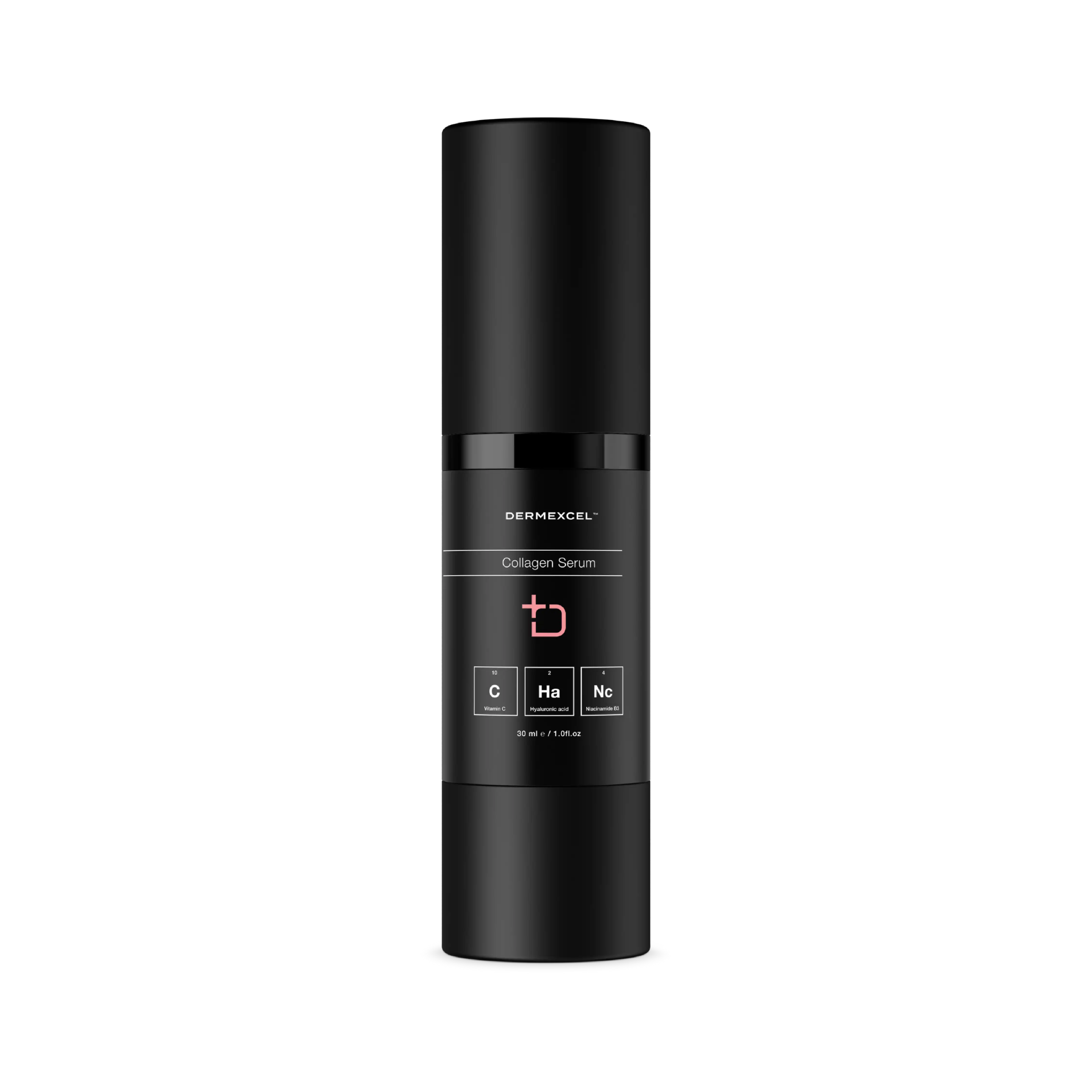
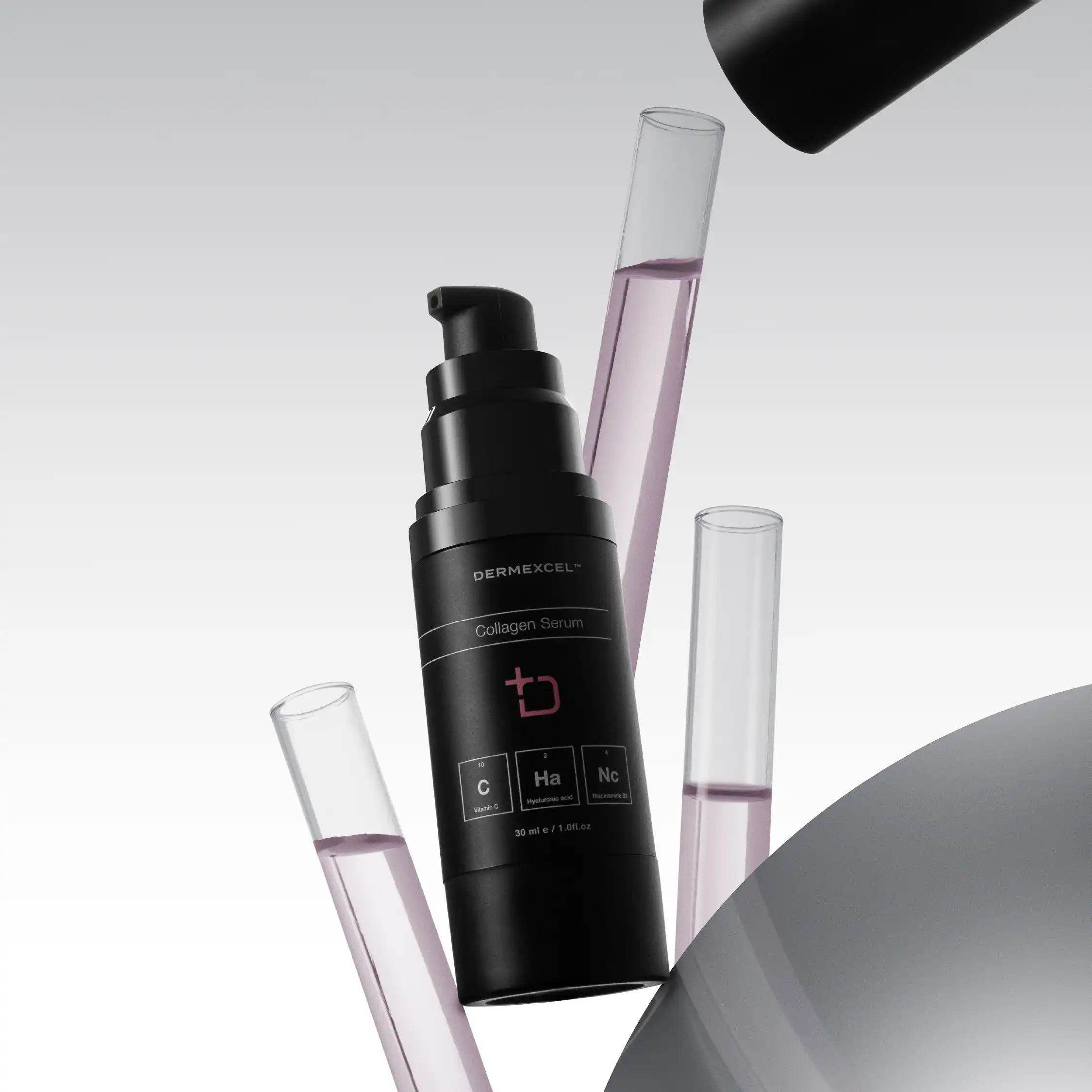




Pay interest-free installments from $27.54 with various payment gateways selected at checkout.
SIZE: 30 mL

Antioxidant

Even Skin Tone

↑ Collagen

anti-aging

Moisturizing
A potent antioxidant formulation designed to brighten skin tone and combat signs of aging. Its unique blend of ingredients is expertly formulated to provide multi-depth serum penetration and optimal hydration. With its remarkable ability to stimulate collagen production, this treatment serum promotes skin elasticity and reduces the appearance of skin aging. It also inhibits melanin production, leading to a brighter complexion and an even skin tone.
Collagen Serum plumps the skin, enhances skin tone, and refines pore size, resulting in a visibly smoother and more youthful appearance.
Vitamin C
Tetrahexyldecyl Ascorbate
Vitamin C is a potent antioxidant that helps neutralize skin free radicals. These free radicals are generated by environmental stressors like UV radiation and pollution, which contribute to premature aging. By neutralizing these harmful molecules, vitamin C helps prevent oxidative skin damage, thereby reducing signs of aging, such as fine lines and wrinkles.
Another significant benefit of vitamin C is its role in collagen production. Collagen is a key protein that gives the skin its structure and firmness. As an essential cofactor for collagen biosynthesis, vitamin C helps maintain skin elasticity and can aid in wound healing and scar reduction.
Vitamin C is also known for its skin-brightening properties. It helps to inhibit the enzyme tyrosinase, which is involved in melanin production. By reducing melanin formation, vitamin C can help lighten hyperpigmentation and even skin tone, leading to a brighter and more radiant complexion.
Tetrahexyldecyl ascorbate is a stable, oil-soluble form of vitamin C. Unlike ascorbic acid, which is water-soluble and can be unstable in certain formulations, tetrahexyldecyl ascorbate is more stable. Due to its lipid-soluble nature, it can penetrate the skin more effectively, reaching the deeper layers of the skin, stimulating collagen production, and providing antioxidant protection.
Physiological Effects
- Antioxidant Properties: Powerful antioxidant that neutralizes free radicals caused by UV radiation and pollution, preventing oxidative stress and damage to the skin.
- Collagen Synthesis: It plays a crucial role in collagen synthesis, aiding in maintaining skin firmness and elasticity and reducing the appearance of fine lines and wrinkles.
- Skin Brightening: Effective in reducing hyperpigmentation and evening out skin tone by inhibiting the enzyme tyrosinase, which is responsible for melanin production.
- Photoprotection: While not a sunscreen, it provides photoprotection by neutralizing free radicals induced by UV exposure.
Managing Dermatological Conditions
- Skin Aging: Reduce signs of aging and improve skin texture.
- Hyperpigmentation: Effective in treating hyperpigmentation, sun spots, and melasma.
- Sun Damage: Help mitigate the effects of sun damage and provide some level of photoprotection.
- General Skin Health: Both forms can improve overall skin health by boosting collagen production and providing antioxidant protection.
THD Specific benefits
- Stable form of Vitamin C: Tetrahexyldecyl Ascorbate is a more stable, lipid-soluble vitamin C, allowing for better skin penetration and less irritation than other forms.
- Enhanced Collagen Production: It has been shown to stimulate collagen production more effectively than ascorbic acid, aiding in anti-aging and skin rejuvenation.
- Hydration and Barrier Function: Due to its lipid-soluble nature, it enhances skin hydration and reinforces the skin barrier.
References
- Pullar, J. M., et al. (2017). The Roles of Vitamin C in Skin Health. Nutrients.
- Murray, J. C., et al. (2008). A Topical Antioxidant Solution Containing Vitamins C and E Stabilized by Ferulic Acid Provides Protection for Human Skin Against Damage Caused by Ultraviolet Irradiation. Journal of the American Academy of Dermatology.
- Al-Niaimi, F., & Chiang, N. Y. Z. (2017). Topical Vitamin C and the Skin: Mechanisms of Action and Clinical Applications. The Journal of Clinical and Aesthetic Dermatology.
Hyaluronic acid
Hyaluronic acid (HA) is a naturally occurring glycosaminoglycan found throughout the body's connective, epithelial, and neural tissues. Most abundantly present in the skin, eyes, and synovial fluid, HA is renowned for its exceptional capacity to retain moisture — a single gram can hold up to six liters of water.
In skincare, the primary appeal of hyaluronic acid lies in its unparalleled hydrating abilities. As a humectant, HA attracts and retains moisture from the environment, providing intense hydration to the skin. This hydrating property contributes significantly to maintaining skin plumpness, suppleness, and elasticity.
Beyond hydration, hyaluronic acid also plays a vital role in skin repair and regeneration. It supports the skin's healing and repair processes, and its anti-inflammatory properties help calm irritated skin. Moreover, HA's ability to promote collagen production, a crucial protein for skin elasticity, further underscores its anti-aging benefits.
The molecular size of hyaluronic acid influences its skin penetration and efficacy. High-molecular-weight HA remains on the skin's surface, providing hydration and forming a barrier against moisture loss. In contrast, low-molecular-weight HA penetrates deeper into the skin's layers, offering more profound hydrating and rejuvenating effects.
Hyaluronic acid's remarkable ability to hydrate, improve skin elasticity, aid in wound healing, and provide antioxidant protection makes it valuable in managing various dermatological conditions, particularly aging, dryness, and sensitive skin.
Physiological Effects
- Hydration: Hyaluronic acid is a powerful humectant that can hold up to 1000 times its weight in water, significantly enhancing skin hydration and leading to plumper, more hydrated skin.
- Skin Elasticity and Wrinkle Reduction: By increasing skin moisture, it improves skin elasticity, reduces the appearance of fine lines and wrinkles, and gives the skin a more youthful appearance.
- Wound Healing: It plays a role in wound healing due to its ability to regulate inflammation levels and signal the body to build more blood vessels in the damaged area.
- Barrier Enhancement: Hyaluronic acid helps reinforce the skin's natural barriers, protecting against environmental factors and retaining moisture.
- Antioxidant Properties: It provides antioxidant defense against free-radical damage from the sun and pollution.
Managing Dermatological Conditions
- Aging Skin: Its ability to reduce wrinkles and improve skin elasticity makes it popular in anti-aging skincare products.
- Dry Skin: Hyaluronic acid is beneficial in treating dry skin conditions by providing intense hydration.
- Wound Care: Its role in wound healing is leveraged in post-procedure care, such as after laser treatments, and in healing minor cuts and abrasions.
- Acne Scars: It can help treat acne scars by promoting skin regeneration and reducing inflammation.
- Sensitive Skin: Hyaluronic acid is suitable for sensitive skin due to its gentle nature. It provides hydration without irritating.
References
- Papakonstantinou, E., Roth, M., & Karakiulakis, G. (2012). Hyaluronic acid: A key molecule in skin aging. Dermato-endocrinology.
- Jegasothy, S. M., Zabolotniaia, V., & Bielfeldt, S. (2014). Efficacy of a new topical nano-hyaluronic acid in humans. The Journal of Clinical and Aesthetic Dermatology.
- Wollina, U., & Abdel-Naser, M. B. (2019). Hyaluronic acid in the treatment and prevention of skin diseases: Molecular biological, pharmaceutical and clinical aspects. Skin Pharmacology and Physiology.
Niacinamide
Niacinamide offers several benefits for the skin, primarily due to its anti-inflammatory and antioxidant properties. It reduces the redness and inflammation associated with acne, rosacea, and other inflammatory skin conditions. Additionally, niacinamide's ability to improve the skin's barrier function benefits all skin types, particularly those with eczema or mature skin.
Another significant benefit of niacinamide is its role in reducing hyperpigmentation. Studies have shown that it can decrease the transfer of melanin to the epidermis, helping to fade dark spots and even out skin tone.
Niacinamide also plays a role in reducing the visible signs of aging. It has been found to stimulate collagen production and improve skin elasticity, reducing fine lines and wrinkles. Its antioxidant properties further protect the skin from environmental damage, such as pollution and UV radiation, which contribute to premature aging.
The efficacy of niacinamide and its ability to address multiple skin concerns simultaneously has led to its growing popularity in both over-the-counter and prescription skincare formulations.
Physiological Effects
- Barrier Function Enhancement: Niacinamide helps strengthen the skin’s barrier function by increasing the production of ceramides, lipids that keep the skin hydrated and protect against environmental damage.
- Anti-inflammatory Properties: It has notable anti-inflammatory effects, which are beneficial in reducing redness and inflammation associated with acne, eczema, and other inflammatory skin conditions.
- Sebum Regulation: Niacinamide helps regulate sebum production, which controls excess oiliness and can benefit acne-prone skin.
- Hyperpigmentation Reduction: It reduces hyperpigmentation by inhibiting melanosome transfer from melanocytes to keratinocytes, leading to an even skin tone.
- Anti-aging Effects: Niacinamide helps reduce the appearance of fine lines and wrinkles by boosting collagen production and improving skin elasticity.
- Antioxidant Activity: It has antioxidant properties, protecting the skin from oxidative stress and environmental aggressors like UV radiation and pollution.
Managing Dermatological Conditions
- Acne and Oily Skin: Niacinamide effectively manages acne and oily skin by regulating sebum and reducing inflammation.
- Hyperpigmentation and Melasma: Its ability to reduce melanin transfer benefits it in treating hyperpigmentation and melasma.
- Aging Skin: Niacinamide targets wrinkles and loss of firmness.
- Skin Barrier Disorders: Niacinamide is beneficial in treating skin barrier disorders like atopic dermatitis and eczema by enhancing barrier function and hydration.
- Photodamage and Skin Protection: It helps mitigate the effects of photodamage and provides some degree of protection against environmental damage.
References
- Gehring, W. (2004). Nicotinic acid/niacinamide and the skin. Journal of Cosmetic Dermatology.
- Bissett, D. L., Oblong, J. E., & Berge, C. A. (2005). Niacinamide: A B vitamin that improves aging facial skin appearance. Dermatologic Surgery.
- Snaidr, V. A., Damian, D. L., & Halliday, G. M. (2019). Nicotinamide for photoprotection and skin cancer chemoprevention: A review of efficacy and safety. Experimental Dermatology.
- Navarrete-Solís, J. et al. (2011). A Double-Blind, Randomized Clinical Trial of Niacinamide 4% versus Hydroquinone 4% in the Treatment of Melasma. Dermatology Research and Practice, 2011.
Hydrotensyl Complex
An active ingredient made from the combination of 3 powerful actives with extraordinary benefits for the skin:
- Honey Extract
- Marine native Collagen
- Marine Hydrolyzed Elastin
Honey Extract
- Provides natural moisturising factor analogue substances to skin cells.
- It also provides the skin with components with a vital capacity for hydro-retention and hydro-regulation.
- Mechanisms of action on skin cells include antioxidant activity and the induction of cytokines, and matrix metalloproteinase expression.
Marine native Collagen
Native Collagen has a high molecular weight, that leaves a protective film on the skin with tensor effects and remarkable moisturizing capabilities.
Marine Hydrolyzed Elastin
- Provide nutrients and amino acids that the fibroblasts (type of skin cell) will use to produce new fibres of elastin and collagen.
- It contains the peptides and amino acids of elastin: Aspartic Acid, Theorine, Serine, Glutamic Acid, Proline, Glycine, Lysine, and Arginine.
It is a complete active ingredient from which the skin will get substances to nourish, increase its moisture, get external protection against damaging substances, and decrease its wrinkles.
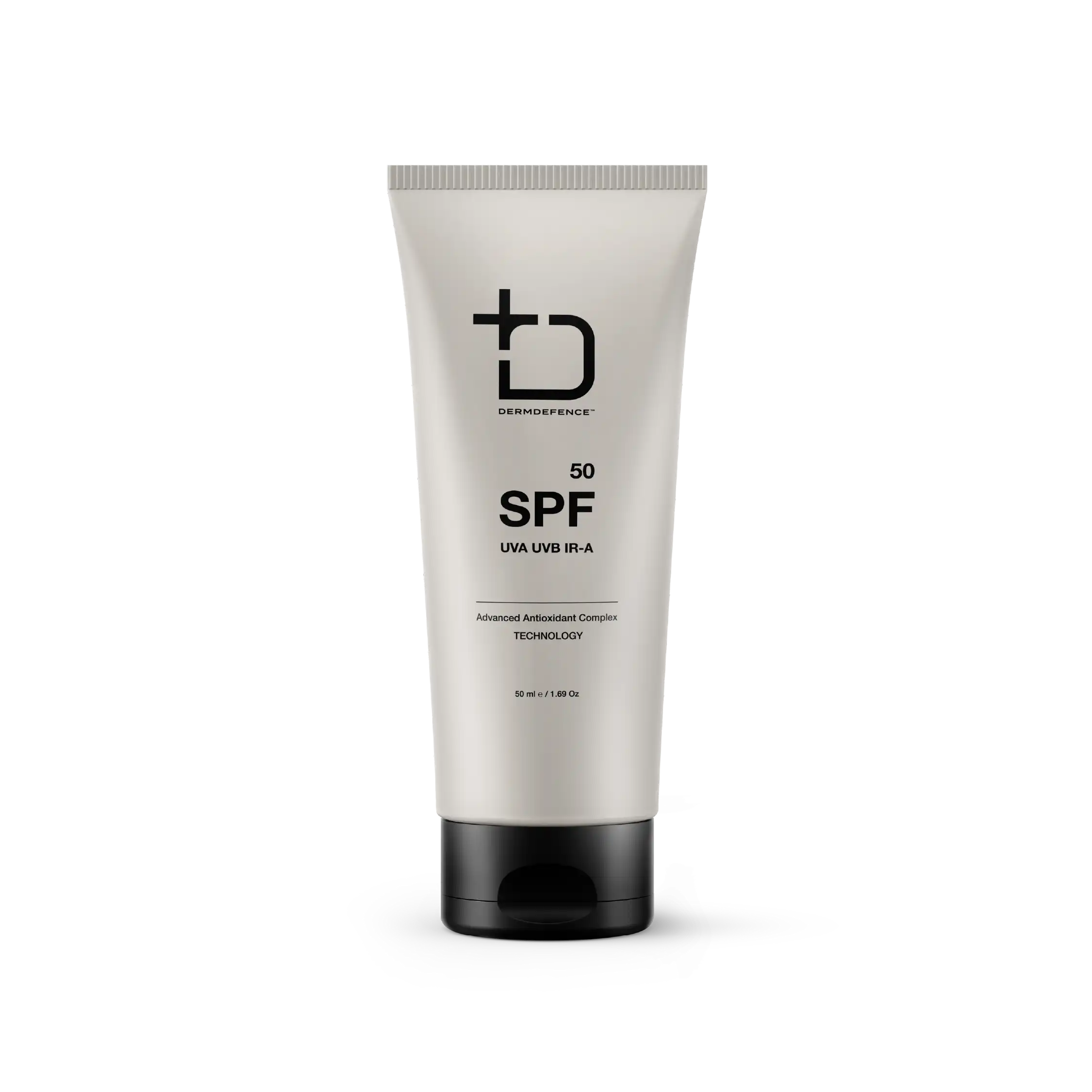
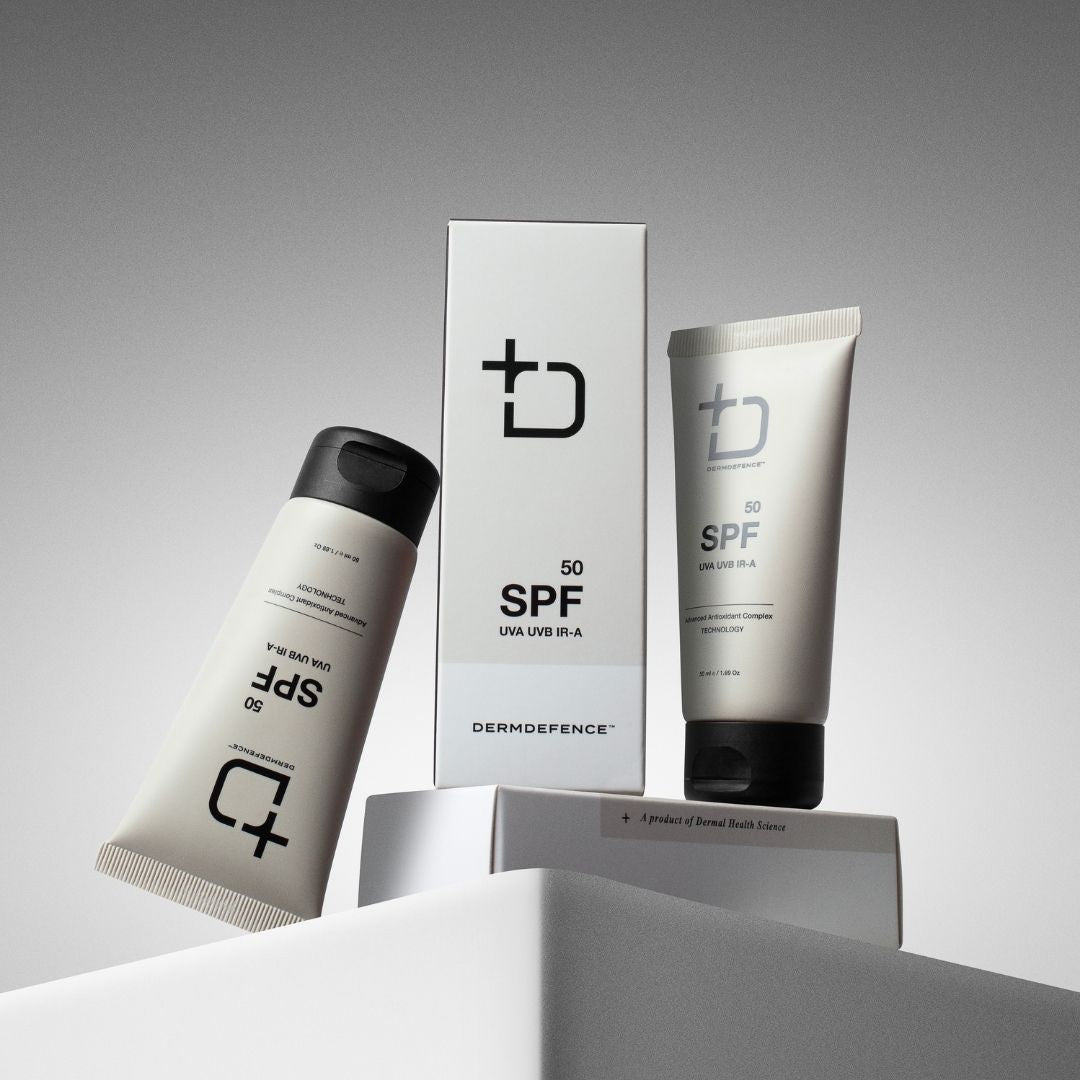




Pay interest-free installments from $11.55 with various payment gateways selected at checkout.
SIZE: 50 mL

Antioxidant

anti-aging

DNA repair

sun protection

Moisturizing
A pioneering sunscreen that provides comprehensive protection against harmful UVA, UVB, infrared rays, and blue light, while supporting your skin's health and resilience. This unique sunscreen counteracts UV radiation-induced free radicals and diminishes UV-induced redness, thus effectively battling signs of aging.
Dermdefence SPF 50 is fragrance-free, anti-comedogenic, lightweight, and easy to apply It absorbs quickly without leaving any white residue. Dermdefence SPF 50 doubles as a smooth primer for effortless makeup application. Dermdefence SPF 50 provides unparalleled sun protection that nurtures your skin's needs while enhancing its radiance and vitality.
Coenzyme Q10
CoQ10 is a potent ingredient that offers comprehensive skin health and appearance benefits. Its role in energy production and its antioxidant and anti-aging properties make it invaluable for photoprotection, anti-aging, and overall skin vitality. Its incorporation into DermExcel sunscreen represents a holistic approach to skin health, addressing protective and restorative needs.
Physiological Impact
- Skin Barrier Enhancement: CoQ10 contributes to the strength and health of the skin barrier, improving its ability to retain moisture and protect against external irritants and pollutants.
- Skin Repair and Regeneration: It supports the skin's natural ability to repair itself and regenerate, maintaining a healthy, youthful appearance. This is particularly beneficial in mature skin, where natural levels of CoQ10 may be depleted.
Pharmacological Advantages
- Anti-Aging Effects: CoQ10's antioxidant properties contribute to its anti-aging effects. By reducing oxidative stress, it helps to minimize the visible signs of aging, such as wrinkles and fine lines.
- Photoprotection: It enhances the skin's defense against photoaging caused by exposure to UV rays. CoQ10 helps to mitigate the degradation of collagen and elastin, proteins essential for maintaining skin elasticity and firmness.
Biochemical Benefits
- Cellular Energy Production: CoQ10 plays a crucial role in the mitochondrial electron transport chain, which is essential for the production of ATP, the primary energy currency of the cell. This function is vital for maintaining the health and vitality of skin cells.
- Antioxidant Properties: It acts as a lipophilic antioxidant, neutralizing free radicals and preventing oxidative damage to cell membranes, proteins, and DNA. This is particularly important in the skin, which is frequently exposed to oxidative stress from environmental factors like UV radiation.
Vitamin E
The fat-soluble Vitamin E's benefits in maintaining skin health and appearance are well-acknowledged in both cosmetic and clinical dermatology. Comprising a group of eight compounds, including four tocopherols and four tocotrienols, Vitamin E is known for its role in protecting cell membranes from oxidative damage.
Vitamin E is celebrated in skincare for its ability to neutralize free radicals caused by environmental stressors such as UV radiation and pollution. These free radicals can lead to premature skin aging, making Vitamin E a valuable ingredient in anti-aging skincare products. Its antioxidant action helps to protect the skin from damage, reduce the appearance of wrinkles, and improve skin texture and tone.
Additionally, Vitamin E is known for its moisturizing benefits. It helps to strengthen the skin barrier, reduce moisture loss, and keep the skin hydrated and supple. This makes it especially beneficial for dry and damaged skin.
Vitamin E also has anti-inflammatory properties, making it beneficial in soothing and calming irritated skin. This has implications for conditions such as dermatitis and acne, where inflammation plays a key role.
Physiological Effects
- Antioxidant Protection: Vitamin E neutralizes harmful free radicals in the skin, preventing oxidative stress and damage caused by environmental factors like UV radiation and pollution.
- Moisturization: It has moisturizing properties, helping to improve skin hydration and alleviate dryness.
- Wound Healing: Vitamin E may assist in the skin's healing process, although its efficacy in wound healing is still a subject of research.
- Photoprotection: While not a sunscreen, it can provide some degree of photoprotection by strengthening the skin's defense against UV-induced damage.
- Anti-Inflammatory Effects: It helps reduce skin inflammation and is beneficial in managing conditions like eczema and psoriasis.
Managing Dermatological Conditions
- Skin Aging: Its antioxidant properties make it useful in anti-aging skincare products to protect against free radical damage and improve skin appearance.
- Dry Skin Conditions: Vitamin E's moisturizing effects are beneficial in treating dry skin and improving overall skin texture.
- Inflammatory Skin Diseases: It can be helpful in soothing inflammatory skin conditions like eczema and psoriasis.
- Sun Protection and Repair: Vitamin E is included in sunscreens and after-sun products for its ability to mitigate sun damage.
- Scar Treatment: Some studies suggest Vitamin E may help reduce the appearance of scars, although evidence is mixed.
References
- Thiele, J. J., Hsieh, S. N., & Ekanayake-Mudiyanselage, S. (1998). Vitamin E: Critical Review of Its Current Use in Cosmetic and Clinical Dermatology. Dermatologic Surgery, 24(7), 805–813.
- Ratz-Łyko, A., & Arct, J. (2016). Anti-inflammatory and anti-aging properties of active skin care ingredients. Journal of Clinical and Aesthetic Dermatology, 9(9), 36–40.
- Keen, M. A., & Hassan, I. (2016). Vitamin E in dermatology. Indian Dermatology Online Journal.
- Ekanayake-Mudiyanselage, S., & Thiele, J. (2007). Vitamin E in human skin: Organ-specific physiology and considerations for its use in dermatology. Molecular Aspects of Medicine.
- Nachbar, F., & Korting, H. C. (1995). The role of vitamin E in normal and damaged skin. Journal of Molecular Medicine.
Broad Spectrum Filters
Tinosorb® M and Tinosorb® S represent sophisticated advancements in sun protection technology.
Tinosorb® M
- Biochemical Action: A unique UV filter due to its ability to function through absorption, reflection, and scattering of UV rays.
- Physiological Impact: The triple-action mechanism of Tinosorb® M offers comprehensive sun protection. By mitigating the penetration of both UVA and UVB rays, it significantly reduces the risk of DNA damage, photoaging, and carcinogenesis. Its ability to remain on the skin's surface reduces systemic exposure, making it a safer option with minimal potential for irritation or allergic reactions.
Tinosorb® S
- Biochemical Action: A broad-spectrum UV filter with a molecular structure that effectively absorbs both UVA and UVB rays. Additionally, it enhances the photostability of other UV filters, making the sunscreen formulation more effective over time.
- Physiological Impact: By providing extensive UVA and UVB protection, Tinosorb® S plays a crucial role in preventing short-term sun damage like sunburn and long-term risks such as skin aging and skin cancer. Its photostability ensures sustained protection during sun exposure, and its compatibility with other UV filters means it can be used to formulate sunscreens that are both effective and suitable for sensitive skin.
Sunscreen
Using sunscreen is a fundamental aspect of skin care and preventive dermatology. It's essential for reducing the risk of skin cancers and photoaging and maintaining overall skin health in the face of constant exposure to UV radiation.
Sunscreen is a vital skincare product designed to protect the skin from the harmful effects of ultraviolet (UV) radiation from the sun. Two primary types of UV radiation affect the skin: UVA and UVB. UVA rays penetrate deep into the skin and are primarily responsible for aging and long-term skin damage, whereas UVB rays cause sunburn and play a key role in developing skin cancer.
Sunscreen products work by either absorbing, reflecting, or scattering sunlight. They contain chemical compounds that absorb UV radiation and convert it into a small amount of heat or physical compounds (like zinc oxide or titanium dioxide) that act as a physical barrier, reflecting UV light away from the skin.
The effectiveness of sunscreen is measured by its Sun Protection Factor (SPF). SPF indicates how well the sunscreen protects against UVB rays. For example, an SPF of 30 means it would take 30 times longer for your skin to burn than without sunscreen. However, it's important to note that no sunscreen can block 100% UV rays.
Regular use of sunscreen with an SPF of at least 30 can reduce the risk of skin cancer, prevent sunburn, and slow down the skin's aging process.
Managing Dermatological Conditions
- Prevention of Sunburn: Sunscreen protects the skin from UVB rays, which cause sunburn. This reduces the immediate risk of skin damage and discomfort.
- Skin Cancer Prevention: Regular use of sunscreen significantly lowers the risk of developing various types of skin cancer, especially melanoma, squamous cell carcinoma, and basal cell carcinoma.
- Prevention of Photoaging: Sunscreen also shields the skin from UVA rays, which penetrate deeper into the skin and are primarily responsible for photoaging, including wrinkles, leathery skin, and sunspots.
- Protection Against Photosensitivity: Sunscreen helps prevent flare-ups triggered by sun exposure for individuals with photosensitive skin conditions like lupus or rosacea.
- Hyperpigmentation and Melasma: It aids in preventing and managing hyperpigmentation and melasma, conditions exacerbated by sun exposure.
- General Skin Health: Sunscreen helps maintain overall skin health and integrity by protecting the skin from UV damage.
References
- Burnett, M. E., & Wang, S. Q. (2011). Current sunscreen controversies: a critical review. Photodermatology, Photoimmunology & Photomedicine.
- Green, A. C., et al. (2011). Reduced melanoma after regular sunscreen use: randomized trial follow-up. Journal of Clinical Oncology.
- Hughes, M. C. B., et al. (2013). Sunscreen and Prevention of Skin Aging: A Randomized Trial. Annals of Internal Medicine.

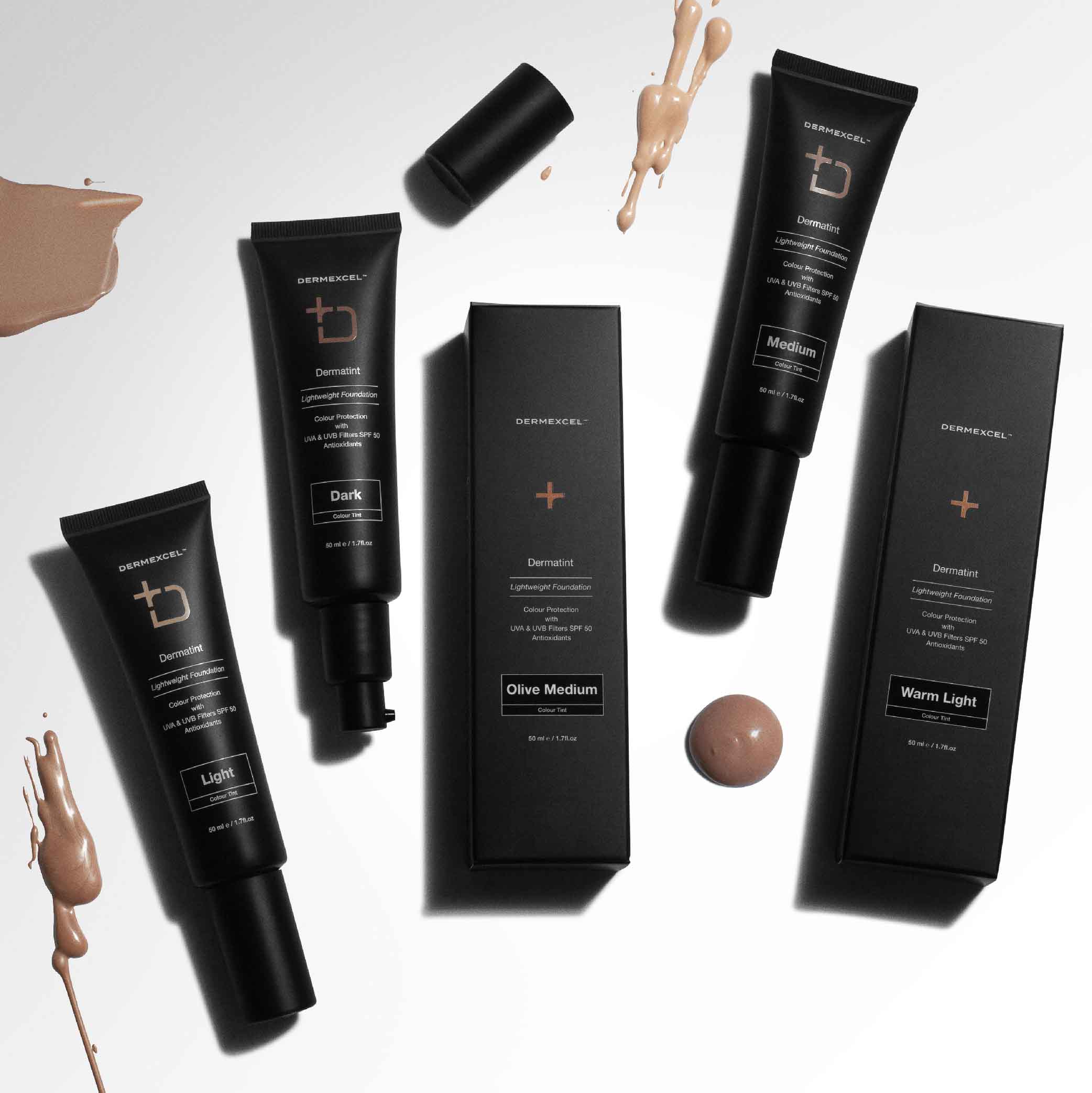

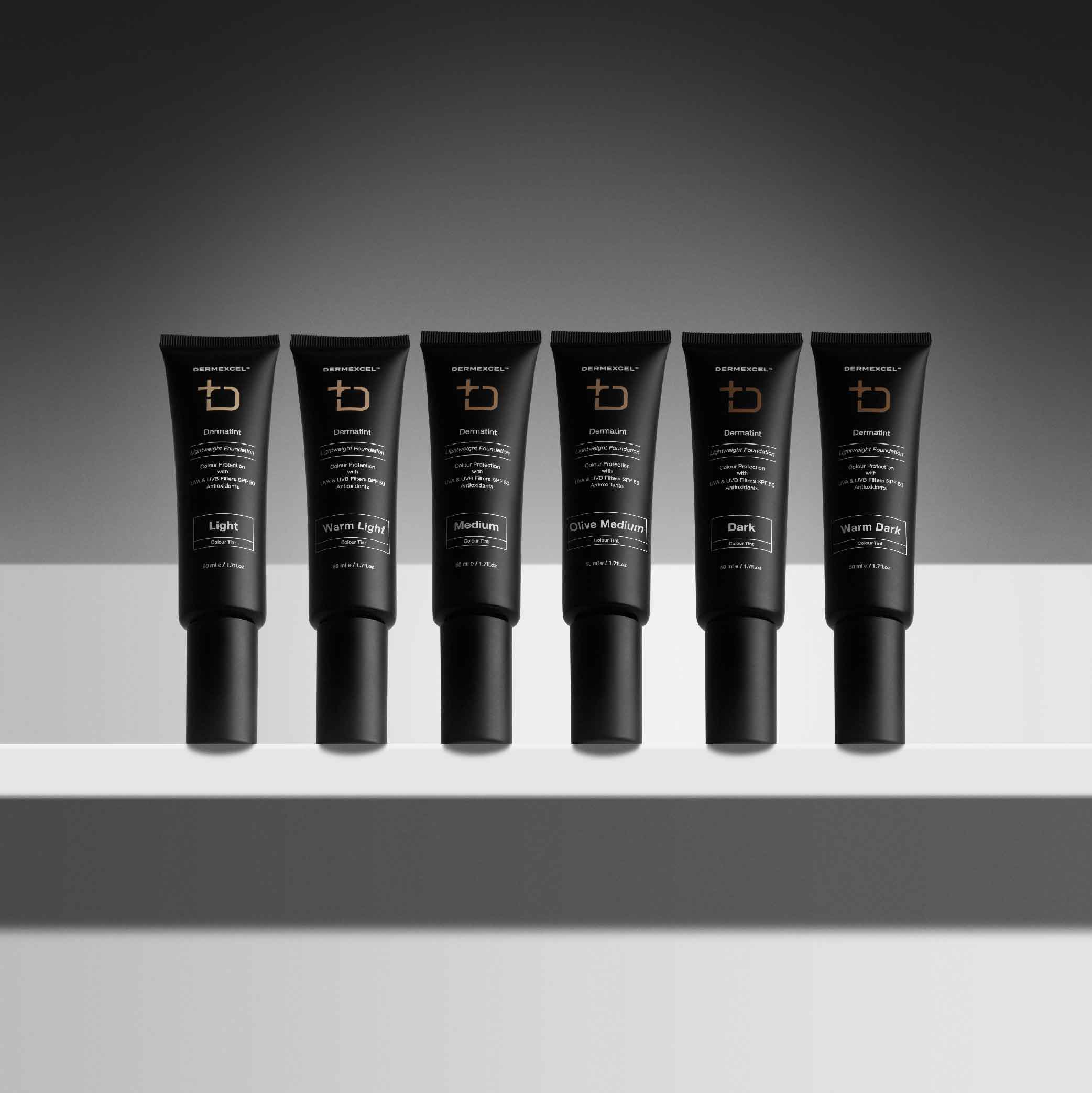


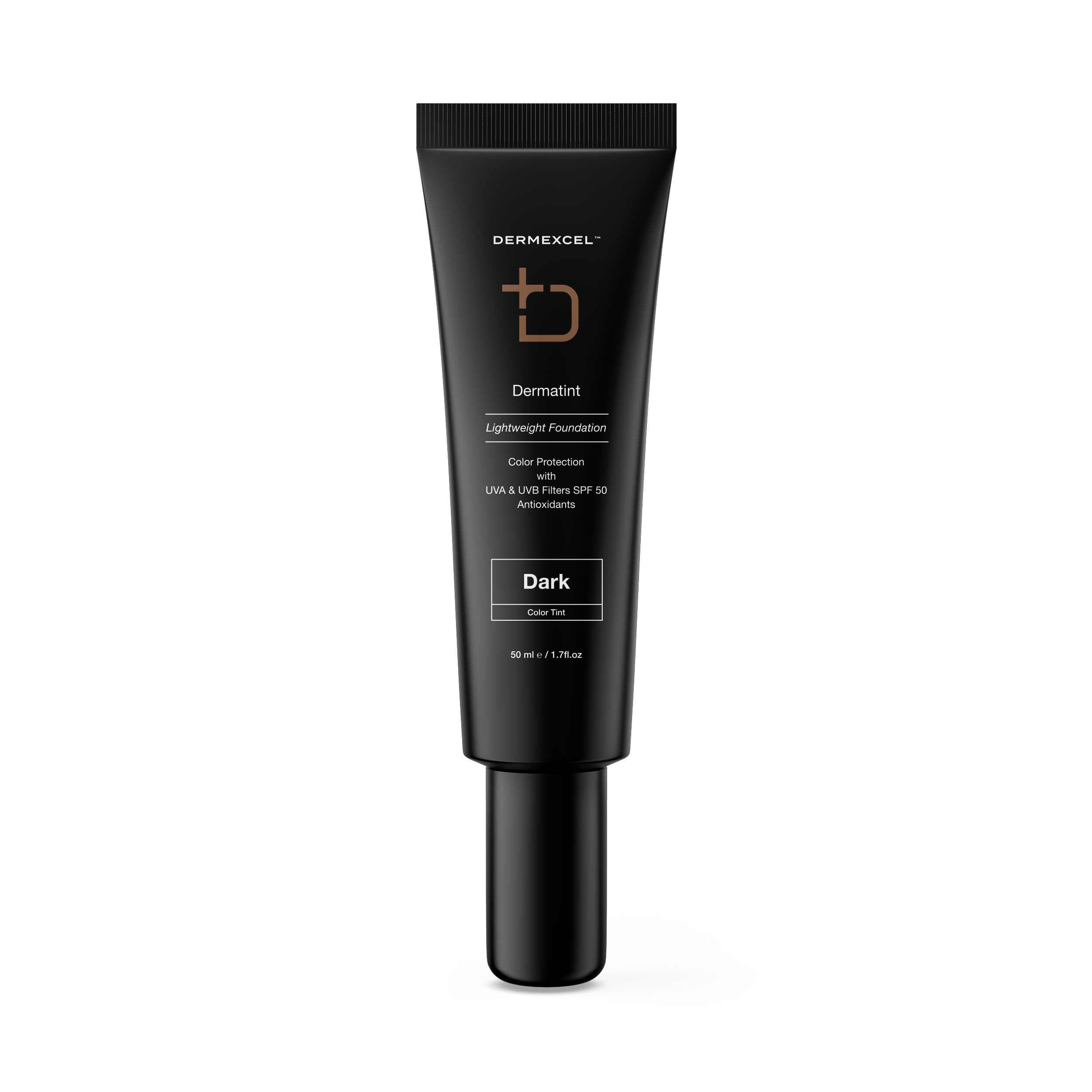
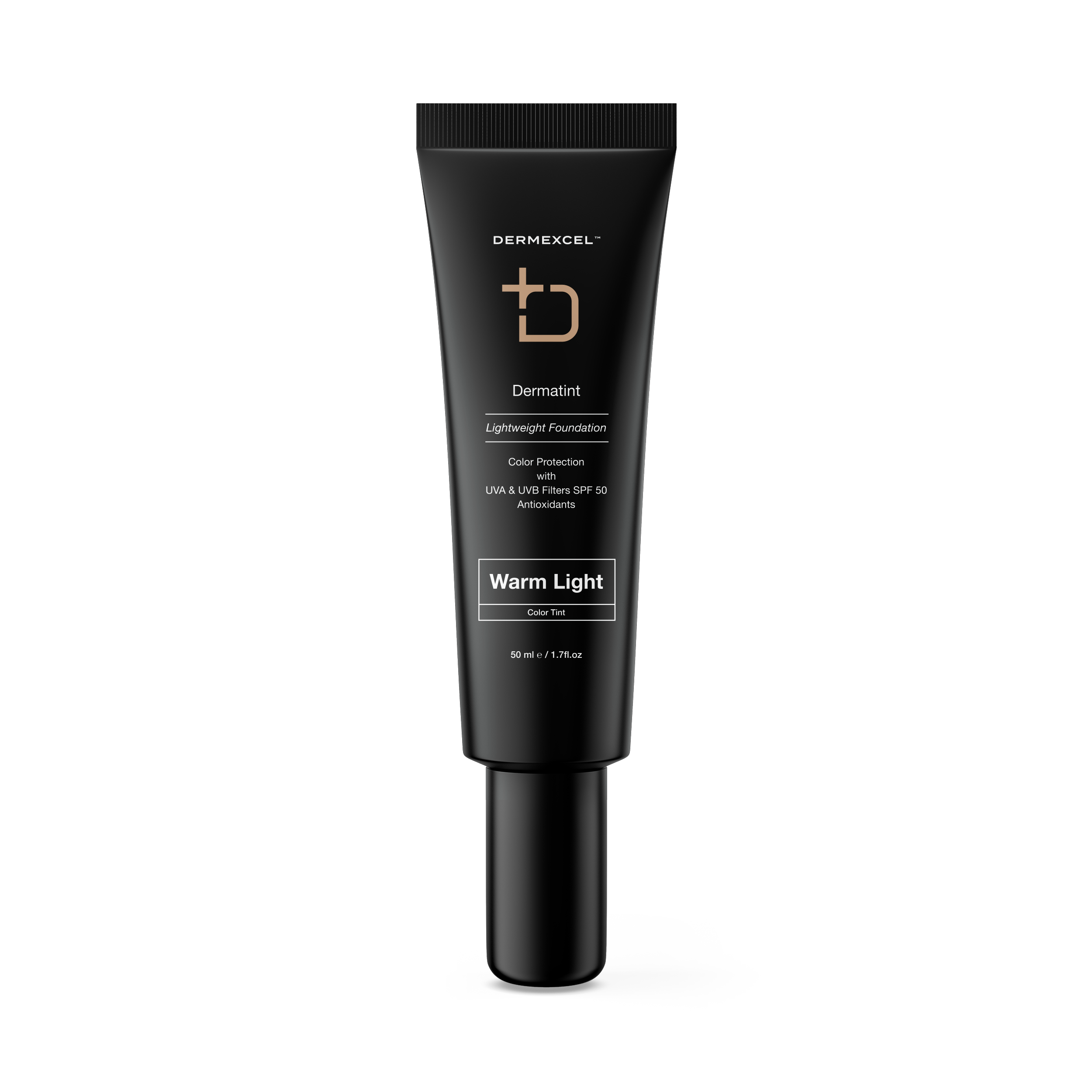
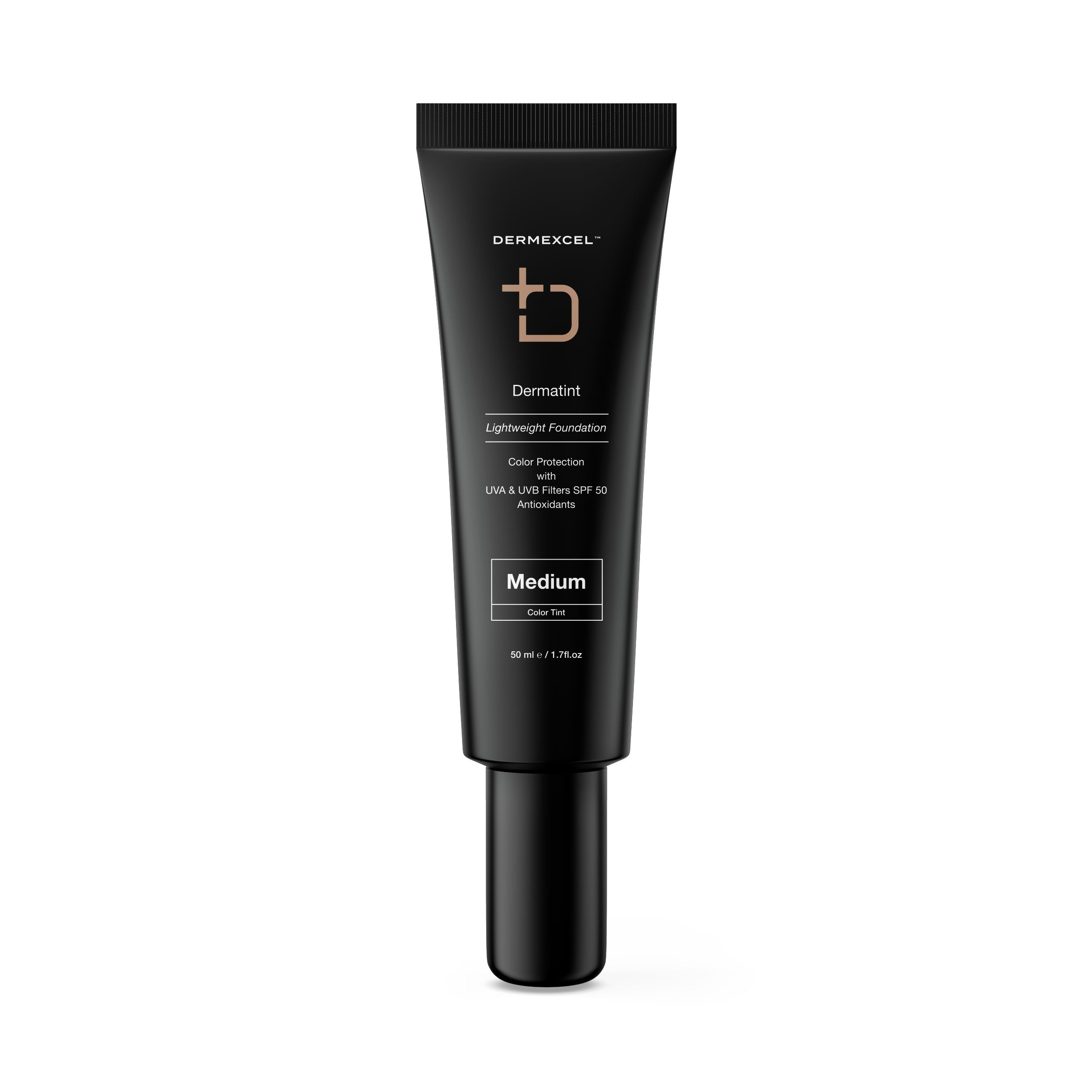
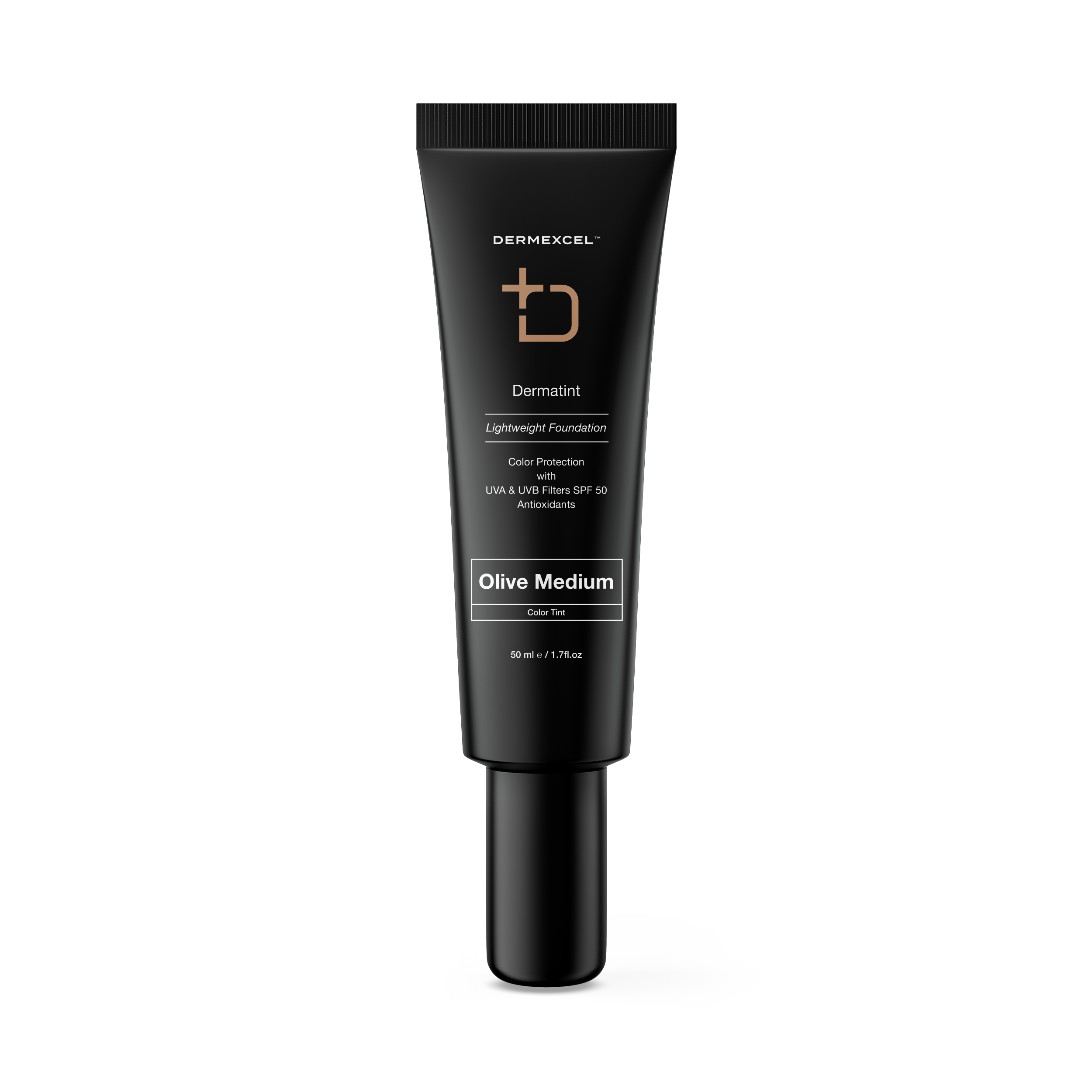




Pay interest-free installments from $16.50 with various payment gateways selected at checkout.

Color Correct

Anti-Aging

Antioxidant

DNA Protection

sun protection
Dermatint SPF 50 blends high-level UV protection with concealment and color correction, crafted through advanced R&D to merge mineral and chemical sunscreens using triple UV filter technology for robust environmental protection.
Incorporating Infraguard®, Dermatint counters free radicals and blue light, preserving collagen and skin vitality. Dermatint SPF 50 moisturizes and soothes, offering more than just sun safety. This multifaceted sunscreen not only protects but also nourishes, making it a superior skincare choice for comprehensive protection and skin health enhancement.
Infraguard™
Infraguard™ is a novel and powerful antioxidant powerhouse designed to protect the skin from the potentially harmful effects of electromagnetic radiation, specifically from 5G networks, blue light, and other environmental stressors. It shields the skin against oxidative stress and inflammation, prevents premature aging, and maintains overall health.
Infraguard® is a multifunctional ingredient that extends beyond traditional sun protection. It addresses the broader spectrum of light-induced skin damage and oxidative stress, provides DNA protection, and offers anti-aging benefits. Its inclusion in the DermExcel sunscreens represents an advanced step in comprehensive skin care, targeting UV rays and the often-overlooked infrared and blue light, ensuring a more holistic approach to maintaining skin health and appearance.
Physiological Effects
- Protection Against Blue Light and Infrared (IR) Radiation: Infraguard is formulated to shield the skin from the harmful effects of blue light and IR radiation, which can lead to premature skin aging and damage.
- Antioxidant Properties: It has strong antioxidant capabilities, helping to neutralize free radicals induced by environmental stressors such as pollution, IR, and blue light.
- Anti-Aging Benefits: By protecting against IR radiation and mitigating oxidative stress, Infraguard helps to prevent signs of aging like wrinkles and loss of skin elasticity.
- Skin Barrier Protection: Infraguard strengthens the skin's natural barrier, enhancing its resilience against environmental factors.
- DNA Protection: Infraguard™ aids in shielding the DNA in skin cells from damage caused by environmental aggressors. This is crucial in maintaining the integrity of skin cells and preventing mutations that can lead to skin aging and other skin-related issues.
Managing Dermatological Conditions
- Preventing Photoaging: Infraguard's ability to protect against IR and blue light makes it beneficial in preventing photoaging, a key concern in modern dermatology. Infrared light can penetrate deeper into the skin than UV rays, potentially leading to increased collagen degradation and skin laxity. Infraguard® helps mitigate these effects.
- Combatting Environmental Stressors: Its antioxidant properties protect the skin from various environmental pollutants and stressors.
- Supporting Skin Health: Infraguard contributes to overall skin health by improving the skin's barrier function and providing antioxidant support.
- Suitability for Diverse Skin Conditions: Given its protective and anti-aging properties, Infraguard is suitable for use in various dermatological conditions, especially environmental damage and aging.
References
- Kappler, Katharina et al. "Development of an in Vitro Assay to Evaluate the Biological Impact of 5G Technology on Human Skin. Journal of Cosmetics, Dermatological Sciences and Applications, 2022, vol. 12, pp. 100-108. DOI: 10.4236/jcdsa.2022.122009.
- Extensive references cited within the research article including studies on 5G technology, health effects, and skin biology.
UVB Filters
Uvinul® T 150 and Uvinul® MC 80 offer superior UVB protection, high photostability and very good skin compatibility.
Uvinul® T 150
- High UVB Absorption: Uvinul® T 150 is known for its exceptionally high UVB absorption. It is one of the most efficient UVB filters on a per weight basis, meaning less of it is required to achieve the same level of protection as other filters.
- Photostability: This compound is highly photostable, meaning it doesn't degrade easily when exposed to sunlight. This property is crucial for maintaining consistent UV protection over time.
- Water Resistance: Uvinul® T 150 improve the water resistance of our sunscreen, beneficial for when you have swimming or outdoor activities.
- Low Irritation Potential: It is generally well-tolerated by the skin, with a lower risk of irritation or sensitization compared to other UVB filters.
Uvinul® MC 80
- Efficacy: With an extensive and impressive safety and efficacy history, Uvinul® MC 80 is highly effective in protecting the skin from UVB rays, which are primarily responsible for sunburn and can contribute to skin cancer.
- Elegance: Uvinul® MC 80 have a fantastic texture, leaving no white cast.
UVA Filters
Uvinul® A Plus is a highly effective, photostable, and skin-friendly UVA filter.
Advantages of Uvinul® A Plus Over Other UVA Filters
- High Efficiency: It has a high UVA absorption capacity, which means that smaller quantities are needed to achieve desired levels of UVA protection.
- Broad-Spectrum UVA Protection and Enhanced Sunscreen Efficacy: Uvinul® A Plus provides strong protection against UVA rays, which are responsible for deeper skin damage including premature aging, wrinkles, and increasing the risk of certain types of skin cancer. By effectively absorbing UVA rays, it complements UVB filters in the formulation to offer broad-spectrum protection, crucial for comprehensive sun care.
- Excellent Photostability: Compared to other UVA filters, Uvinul® A Plus is more photostable, reducing the risk of degradation and loss of efficacy when exposed to sunlight.
- Skin Compatibility: It is generally well-tolerated by the skin, with a lower incidence of irritation or allergic reactions compared to other UVA filters.
- Elegance: Uvinul® A Plus is pleasant to use and apply evenly - without leaving a white cast on your skin!
Broad Spectrum Filters
Tinosorb® M and Tinosorb® S represent sophisticated advancements in sun protection technology.
Tinosorb® M
- Biochemical Action: A unique UV filter due to its ability to function through absorption, reflection, and scattering of UV rays.
- Physiological Impact: The triple-action mechanism of Tinosorb® M offers comprehensive sun protection. By mitigating the penetration of both UVA and UVB rays, it significantly reduces the risk of DNA damage, photoaging, and carcinogenesis. Its ability to remain on the skin's surface reduces systemic exposure, making it a safer option with minimal potential for irritation or allergic reactions.
Tinosorb® S
- Biochemical Action: A broad-spectrum UV filter with a molecular structure that effectively absorbs both UVA and UVB rays. Additionally, it enhances the photostability of other UV filters, making the sunscreen formulation more effective over time.
- Physiological Impact: By providing extensive UVA and UVB protection, Tinosorb® S plays a crucial role in preventing short-term sun damage like sunburn and long-term risks such as skin aging and skin cancer. Its photostability ensures sustained protection during sun exposure, and its compatibility with other UV filters means it can be used to formulate sunscreens that are both effective and suitable for sensitive skin.
Coenzyme Q10
CoQ10 is a potent ingredient that offers comprehensive skin health and appearance benefits. Its role in energy production and its antioxidant and anti-aging properties make it invaluable for photoprotection, anti-aging, and overall skin vitality. Its incorporation into DermExcel sunscreen represents a holistic approach to skin health, addressing protective and restorative needs.
Physiological Impact
- Skin Barrier Enhancement: CoQ10 contributes to the strength and health of the skin barrier, improving its ability to retain moisture and protect against external irritants and pollutants.
- Skin Repair and Regeneration: It supports the skin's natural ability to repair itself and regenerate, maintaining a healthy, youthful appearance. This is particularly beneficial in mature skin, where natural levels of CoQ10 may be depleted.
Pharmacological Advantages
- Anti-Aging Effects: CoQ10's antioxidant properties contribute to its anti-aging effects. By reducing oxidative stress, it helps to minimize the visible signs of aging, such as wrinkles and fine lines.
- Photoprotection: It enhances the skin's defense against photoaging caused by exposure to UV rays. CoQ10 helps to mitigate the degradation of collagen and elastin, proteins essential for maintaining skin elasticity and firmness.
Biochemical Benefits
- Cellular Energy Production: CoQ10 plays a crucial role in the mitochondrial electron transport chain, which is essential for the production of ATP, the primary energy currency of the cell. This function is vital for maintaining the health and vitality of skin cells.
- Antioxidant Properties: It acts as a lipophilic antioxidant, neutralizing free radicals and preventing oxidative damage to cell membranes, proteins, and DNA. This is particularly important in the skin, which is frequently exposed to oxidative stress from environmental factors like UV radiation.















